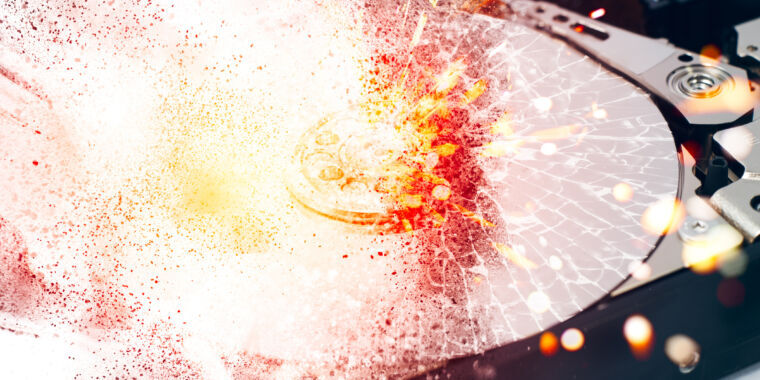My father told me he wanted to make USB flash drives of all the scanned and digitized family photos and other assorted letters and mementos. He planned to distribute them to all family members hoping that at least one set would survive. When I explained that they ought to be recipes to new media every N number of years or risk deteriorating or becoming unreadable (like a floppy disk when you have no floppy drive), he was genuinely shocked. He lost interest in the project that he’d thought was so bullet proof.



That’s why I back up my data on stone tablets in Cunieform.
Seriously though, if you wanted data to last for centuries, what would be your best bet? Would it be some sort of 3D-printed mechanical storage? At least plastics are generally not biodegradable, though they are photodegradable, so I guess you’d want to stick your archive in a dry cave somewhere?
Or what about this idea of encoding the data in the DNA of some microbe and cutting it loose? What could possibly go wrong?
Archival grade m-discs, apparently. I had the same question. https://www.howtogeek.com/858426/whats-the-best-way-to-store-data-for-decades-or-centuries/
https://www.amazon.com/s?k=archival+mdisk
It’s a shame their capacity lags so far behind current hard drives. And not many drives for these discs are still made, so what are the chances of them becoming unreadable just because no one has equipment to read them?
Cool! I can see how optical media could, in theory, be very long-lasting as long as you don’t use materials that oxidize or otherwise degrade over time.
Please stop that, DNA is good for mutations, not for long-term consistency.
Well I guess I’m picturing DNA encoding like a RAID billion in terms of redundancy, so with some checksumming, you ought be able to sort out any mutations? But I’m no geneticist.
There’s also that pesky low r/w bitrate.
Magnetic tape?
Magnetic tape only lasts for a decade or two.
OK, punch tape it is then.
It’s baffling, you can do a lot of tasks with a compact version of PDP-11 (there were two Soviet clones, I don’t remember which of them is which - one was a proper one, and could be used as a terminal server too, another had the monitor board simplified, IIRC, making it more of a normal PC of that time, just with PDP-11 CSA and the OS was RTX-11 in essence, but reverse-engineered and localized and with hardware drivers for those machines).
(I know it’s a different period and they had floppies.)
Why do we need such enormously complex fragile things? We rely on them so much that if, say, a “global thermonuclear war” really happens, with following hunger, movements of population, rapid climate changes, - our civilization is profoundly fucked.
Paper tape would probably work, as long as you could find a reliable reader for it. I’m actually old enough to have used it and the readers often had problems. Getting rid of the mechanical aspects of the reader and replacing them with light sensors would go a long way toward fixing that.
Paper doesn’t last, is hard to store, and the information density is miserable.